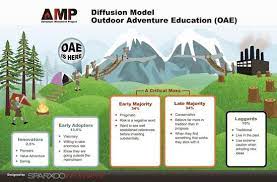The Power of Adventure Education: Unlocking Learning Through Experience
Adventure education is a dynamic and experiential approach to learning that takes students out of the traditional classroom setting and into the great outdoors. It embraces activities such as rock climbing, hiking, camping, and orienteering to foster personal growth, teamwork, problem-solving skills, and resilience.
One of the key benefits of adventure education is its ability to challenge individuals both physically and mentally. By stepping out of their comfort zones and facing unfamiliar situations, participants learn to adapt, overcome obstacles, and develop a sense of self-efficacy.
Furthermore, adventure education promotes collaboration and communication among participants. Team-building activities require individuals to work together towards a common goal, fostering trust and camaraderie. These experiences not only strengthen interpersonal relationships but also enhance leadership skills.
Another significant aspect of adventure education is its focus on environmental awareness and sustainability. Participants develop a deep appreciation for nature as they engage in outdoor activities, leading to a greater understanding of ecological systems and the importance of conservation.
Through hands-on experiences in natural settings, adventure education encourages curiosity, creativity, and critical thinking. Participants are encouraged to explore their surroundings, solve problems creatively, and make decisions independently – skills that are essential for success in today’s rapidly changing world.
In conclusion, adventure education offers a transformative learning experience that goes beyond textbooks and lectures. By immersing participants in real-world challenges and opportunities for growth, it equips them with valuable life skills that will serve them well in all areas of their lives. So why not step outside your comfort zone and embark on an adventure that could change your perspective forever?
Five Key Principles of Effective Adventure Education: Expanding Horizons and Fostering Teamwork in the Great Outdoors
- Encourage students to step out of their comfort zone and try new activities.
- Emphasize the importance of teamwork and communication during outdoor challenges.
- Teach students about environmental conservation and respect for nature while exploring outdoors.
- Provide opportunities for reflection and debriefing after each adventure activity to help students learn from their experiences.
- Ensure safety is a top priority by following proper procedures, providing necessary equipment, and having trained staff supervising all activities.
Encourage students to step out of their comfort zone and try new activities.
Encouraging students to step out of their comfort zone and try new activities is a fundamental principle of adventure education. By challenging themselves with unfamiliar experiences, students have the opportunity to expand their horizons, build resilience, and discover hidden talents. Stepping outside their familiar routines not only fosters personal growth but also cultivates a sense of curiosity and adaptability that are essential for navigating the complexities of the modern world. Embracing new challenges in the realm of adventure education can lead to transformative learning experiences that empower students to overcome obstacles and thrive in diverse environments.
Emphasize the importance of teamwork and communication during outdoor challenges.
In the realm of adventure education, highlighting the significance of teamwork and communication when tackling outdoor challenges is paramount. By fostering a collaborative spirit among participants, individuals learn to rely on each other’s strengths, support one another through difficulties, and celebrate shared achievements. Effective communication ensures that ideas are exchanged clearly, roles are defined concisely, and strategies are coordinated seamlessly, leading to successful outcomes and strengthened bonds among team members. Through prioritising teamwork and communication in outdoor endeavours, participants not only enhance their problem-solving abilities but also cultivate a sense of unity and camaraderie that transcends the challenges they face.
Teach students about environmental conservation and respect for nature while exploring outdoors.
By incorporating lessons on environmental conservation and fostering a deep respect for nature into outdoor explorations, adventure education provides students with a holistic learning experience. Not only do participants engage in thrilling outdoor activities, but they also gain a profound understanding of the importance of preserving our natural world. Through hands-on experiences in the great outdoors, students learn to appreciate the beauty of nature and understand their role in protecting it for future generations. This integration of environmental education into adventure learning not only enriches the educational experience but also instills a sense of responsibility and stewardship towards the environment.
Provide opportunities for reflection and debriefing after each adventure activity to help students learn from their experiences.
Providing opportunities for reflection and debriefing after each adventure activity is a crucial element of adventure education. By taking the time to pause and discuss their experiences, students can gain valuable insights into their actions, emotions, and interactions during the activity. This process allows them to identify strengths, areas for improvement, and lessons learned, fostering a deeper understanding of themselves and their capabilities. Reflection and debriefing not only enhance the learning outcomes of the adventure but also promote personal growth, self-awareness, and resilience in students as they navigate future challenges.
Ensure safety is a top priority by following proper procedures, providing necessary equipment, and having trained staff supervising all activities.
Ensuring safety is paramount in adventure education. By adhering to established procedures, equipping participants with the necessary gear, and having experienced staff oversee all activities, a secure environment is created for students to explore and learn. Prioritising safety not only minimises risks but also instils confidence in participants, allowing them to fully immerse themselves in the educational experience without worry.

